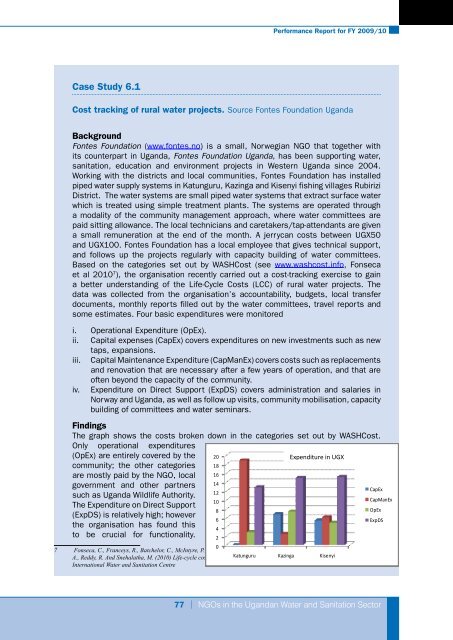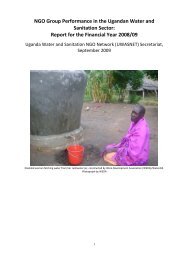Performance Report for FY 2009/10 - UWASNET
Performance Report for FY 2009/10 - UWASNET
Performance Report for FY 2009/10 - UWASNET
Create successful ePaper yourself
Turn your PDF publications into a flip-book with our unique Google optimized e-Paper software.
Case Study 6.1<br />
<strong>Per<strong>for</strong>mance</strong> <strong>Report</strong> <strong>for</strong> <strong>FY</strong> <strong>2009</strong>/<strong>10</strong><br />
Cost tracking of rural water projects. Source Fontes Foundation Uganda<br />
Background<br />
Fontes Foundation (www.fontes.no) is a small, Norwegian NGO that together with<br />
its counterpart in Uganda, Fontes Foundation Uganda, has been supporting water,<br />
sanitation, education and environment projects in Western Uganda since 2004.<br />
Working with the districts and local communities, Fontes Foundation has installed<br />
piped water supply systems in Katunguru, Kazinga and Kisenyi fishing villages Rubirizi<br />
District. The water systems are small piped water systems that extract surface water<br />
which is treated using simple treatment plants. The systems are operated through<br />
a modality of the community management approach, where water committees are<br />
paid sitting allowance. The local technicians and caretakers/tap-attendants are given<br />
a small remuneration at the end of the month. A jerrycan costs between UGX50<br />
and UGX<strong>10</strong>0. Fontes Foundation has a local employee that gives technical support,<br />
and follows up the projects regularly with capacity building of water committees.<br />
Based on the categories set out by WASHCost (see www.washcost.info, Fonseca<br />
et al 20<strong>10</strong> 7 ), the organisation recently carried out a cost-tracking exercise to gain<br />
a better understanding of the Life-Cycle Costs (LCC) of rural water projects. The<br />
data was collected from the organisation’s accountability, budgets, local transfer<br />
documents, monthly reports filled out by the water committees, travel reports and<br />
some estimates. Four basic expenditures were monitored<br />
i. Operational Expenditure (OpEx).<br />
ii. Capital expenses (CapEx) covers expenditures on new investments such as new<br />
taps, expansions.<br />
iii. Capital Maintenance Expenditure (CapManEx) covers costs such as replacements<br />
and renovation that are necessary after a few years of operation, and that are<br />
often beyond the capacity of the community.<br />
iv. Expenditure on Direct Support (ExpDS) covers administration and salaries in<br />
Norway and Uganda, as well as follow up visits, community mobilisation, capacity<br />
building of committees and water seminars.<br />
Findings<br />
The graph shows the costs broken down in the categories set out by WASHCost.<br />
Only operational expenditures<br />
(OpEx) are entirely covered by the<br />
community; the other categories<br />
are mostly paid by the NGO, local<br />
government and other partners<br />
such as Uganda Wildlife Authority.<br />
The Expenditure on Direct Support<br />
(ExpDS) is relatively high; however<br />
the organisation has found this<br />
to be crucial <strong>for</strong> functionality.<br />
20<br />
18<br />
16<br />
14<br />
12<br />
<strong>10</strong><br />
8<br />
6<br />
4<br />
2<br />
Expenditure in UGX<br />
(Million)<br />
0<br />
7 Fonseca, C., Franceys, R., Batchelor, C., McIntyre, P., Klutse, A., Komives, K., Moriarty, P., Naafs, A., Nyaro, K., Pezon, C., Potter,<br />
A., Reddy, R. And Snehalatha, M. (20<strong>10</strong>) Life-cycle costs approach Katunguru – glossary and components, Kazinga WASHCost KisenyiBriefing<br />
note 1, IRC<br />
International Water and Sanitation Centre<br />
CapEx<br />
CapManEx<br />
OpEx<br />
ExpDS<br />
77 | NGOs in the Ugandan Water and Sanitation Sector



